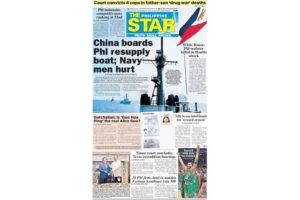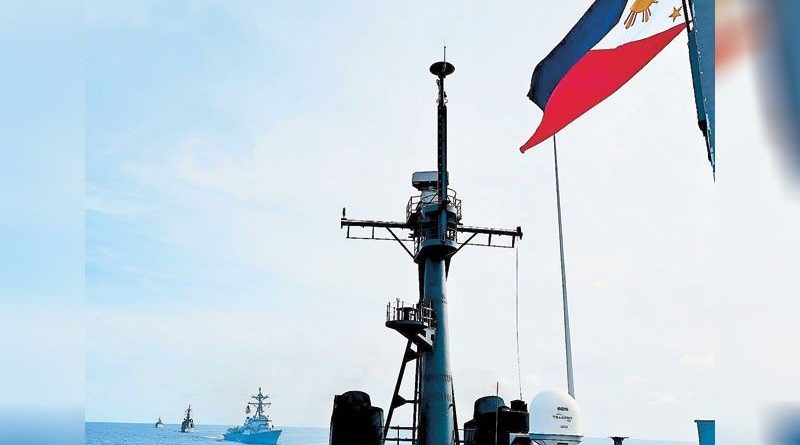ASEAN HEADLINE-ASIA GEO POLITICS | China boards Philippines resupply boat; Navy men hurt
The US Navy guided-missile destroyer USS Ralph Johnson, the Japan Maritime Self-Defense Force ship JS Kirisame and the Royal Canadian Navy frigate HMCS Montreal follow the BRP Andres Bonifacio in formation during the 2nd multilateral maritime cooperative exercises in the West Philippine Sea.

MANILA, Philippines — The latest attempt by China Coast Guard to block the delivery of food and provisions to the BRP Sierra Madre in Ayungin Shoal last Monday left at least eight Filipinos injured – with one losing a finger – and several others disarmed and their inflatable boats punctured by the Chinese, according to military sources.
The Armed Forces of the Philippines (AFP) and Department of National Defense, however, have yet to provide details on the incident, which reportedly also involved the collision of a Chinese ship with a Philippine supply vessel.
A source said injured were seven members of the Navy’s Special Operations Group and a soldier who lost a finger.
The AFP confirmed one Navy personnel “sustained severe injury” and was “safely evacuated” for treatment.
China itself had already admitted that its personnel boarded, inspected and supposedly drove away Philippine Navy vessels. It blamed the Philippines for the collision.
Defense Secretary Gilbert Teodoro Jr., in a statement, lashed out at the CCG for its “dangerous and reckless behavior” while the AFP slammed its “deceptive and misleading claims.”
China’s latest act of aggression happened two days after its supposed enforcement of a “maritime regulation” allowing its coast guard to seize foreign ships that “illegally enter China’s territorial waters” and to detain their crews for up to 60 days.
“The CCG’s continued aggressive behavior and unprofessional conduct towards a legitimate humanitarian mission is unacceptable. They must restrain themselves to avoid escalating tensions” in the West Philippine Sea, AFP public affairs office chief Col. Xerxes Trinidad said in a statement.
“The AFP remains committed to maintaining our presence in the WPS, adhering to international law to protect our seas, our rights and our future,” he added.
Ayungin Shoal is within the Philippines’ exclusive economic zone, as affirmed in a July 2016 ruling by the Permanent Court of Arbitration based in The Hague.
In a statement, the Department of Foreign Affairs (DFA) slammed China for its provocative actions and distortion of facts.
“The Philippines urges China to stop its provocative behavior and distortion of the facts, including through enactment and enforcement of domestic laws and regulations that overreach into the legally-settled maritime zones of the Philippines in violation of international law,” the DFA said.
“We call on China to show sincerity in working together to de-escalate the situation, in the spirit of dialogue and the peaceful settlement of disputes,” it added.
…
International condemnation
Amid the latest flare-up in the West Philippine Sea, the United States and the European Union, as well as ambassadors of various countries, denounced China’s use of force to stop a resupply mission for Filipino troops on Sierra Madre.
The US State Department’s second ranking diplomat reaffirmed yesterday his country’s commitment to the Philippines under the Mutual Defense Treaty.
Deputy Secretary of State Kurt Campbell also denounced China’s “escalatory and irresponsible” actions near Ayungin Shoal.
“The United States stands with its ally the Philippines and condemns the escalatory and irresponsible actions by the People’s Republic of China (PRC) to deny the Philippines from lawfully delivering humanitarian supplies to service members stationed at the BRP Sierra Madre on June 17,” the State Department said in a statement.
State Department spokesman Matthew Miller said Campbell made a phone call to Foreign Affairs Undersecretary Maria Theresa Lazaro to discuss the latest Ayungin Shoal incident.
Miller said Campbell and Lazaro discussed shared concerns over the “People’s Republic of China’s escalatory and irresponsible actions on June 17, which obstructed the Philippines from executing a lawful maritime operation in the South China Sea, interfering with the Philippines’ freedom of navigation.”
“The Deputy Secretary and Undersecretary agreed that the PRC’s dangerous actions threatened regional peace and stability,” Miller said in a statement.
“The Deputy Secretary reaffirmed that Article IV of the 1951 United States-Philippines Mutual Defense Treaty extends to armed attacks on Philippine armed forces, public vessels or aircraft – including those of its Coast Guard – anywhere in the South China Sea,” he pointed out.
The past weeks saw a flurry of Chinese provocations in the West Philippine Sea, some even bordering on the inhumane, according to observers.
On May 19, CCG harassed Philippine service members being medically evacuated and unlawfully seized airdropped provisions. On numerous occasions over the past year, China used water cannons and dangerous maneuvers against Philippine routine supply missions.
“Beijing’s actions reflect consistent disregard for the safety of Filipinos and for international law in the South China Sea,” Miller stated.
“The United States condemns the PRC’s aggressive, dangerous maneuvers near Ayungin (Second Thomas) Shoal, which caused bodily injury, damaged Philippine vessels and hindered lawful maritime operations to supply food, water and essential supplies to personnel within the Philippine exclusive economic zone,” US Ambassador MaryKay Carlson wrote on X (formerly Twitter).
“We stand by our allies in support of a #FreeAndOpenIndoPacific,” she added.
…
Respect for UNCLOS
EU Ambassador Luc Veron said China’s actions have caused harm, damaged Philippine vessels and disrupted lawful maritime operations in the Philippines’ EEZ.
“The EU opposes coercion and intimidation in the South China Sea, or anywhere. We support international law and peaceful dispute resolution,” Veron said in a post on X.
The French embassy, for its part, reiterated its call for respect for international law, particularly the United Nations Convention on the Law of the Sea or UNCLOS.
“We oppose any threat or use of force contrary to international law and recall the importance of resolving disputes through dialogue. We also recall the decision rendered by the Arbitral Court on July 12, 2016,” the embassy said in a statement.
Japan, Canada, Germany, Finland, Australia, the United Kingdom the Netherlands and South Korea also denounced China’s actions and called on Beijing to recognize the arbitral ruing.
Japan’s Ambassador Kazuya Endo said Japan stands with Manila and would cooperate with like-minded countries in “maintaining and enhancing the free and open international order based on the rule of law.”
Canadian Ambassador David Hartman condemned China’s acts of violence, including the ramming and towing of Philippine vessels, saying “these dangerous and destabilizing actions caused injuries and put at risk stability, security and prosperity in the Indo-Pacific region.”
The Netherlands said China’s “irresponsible maneuvers” endangered the safety of ships and crews and posed an open challenge to “the freedom of sea routes guaranteed under international law.”
“Netherlands considers it of utmost importance that the 2016 arbitral award is fully respected and implemented,” Dutch Ambassador Marielle Geraedts wrote on X.
In a post on X, Australian Ambassador HK Yu said “Australia shares the Philippines’ deep concern at dangerous and illegal actions by China’s vessels near Second Thomas Shoal, causing injury, damaging Philippines vessels and endangering lives and regional stability.”
“States must act consistently with international law, including UNCLOS,” she added.
…
Fish catch unaffected
Meanwhile, the Bureau of Fisheries and Aquatic Resources (BFAR) downoplayed China’s “maritime regulation,” saying it would not affect fish catch in the West Philippine Sea.
“First and foremost, the Philippines does not recognize this unilateral declaration of China. The Philippines would continue fishing [in the West Philippine Sea],” BFAR spokesman Nazario Briguera said at a press briefing yesterday.
“We do not see the unilateral declaration of China will actually create impact in terms of production because first and foremost we do not recognize this declaration,” he added.
Briguera revealed BFAR has not yet received any reports of Chinese detaining Filipino fisherman since the start of the regulation’s enforcement.
“And if they are going to detain Filipino fishermen then it would be another provocation on the part of China that can be considered as a violation of international laws.
Despite rising tensions with China, the Philippines expanded its fish catch in the WPS last year to a four-year high of over 200,000 metric tons on the back of higher state support for fishermen.
Citing Philippine Statistics Authority data, the BFAR earlier said the country’s fisheries output in the WPS in 2023 reached 201,894.49 metric tons, almost 15 percent more than the 175,784.73 MT recorded in 2022.
Fish catch from the WPS accounts for about seven percent of the country’s annual fish supply for food consumption. — Jasper Emmanuel Arcalas


 Memento Maxima Digital Marketing
Memento Maxima Digital Marketing







